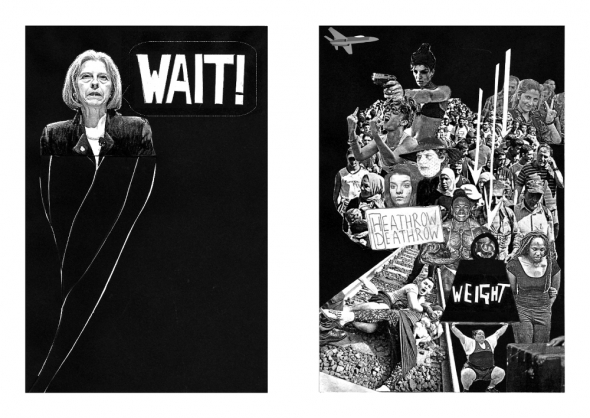Everyone’s Grievous Banquet
And I want us to be a country where it doesn’t matter where you were born, who your parents are, where you went to school, what your accent sounds like, what god you worship, whether you’re a man or a woman, gay or straight, or black or white.
– Theresa May, 5 October 2016, Conservative Party Conference
Now that Theresa May has delivered her first speech as Prime Minister to the Conservative Party Conference, certain things begin to become clearer. Perhaps the first among these has to do with question of what the ideological basis will be for national unity in the coming period. May’s exercise in re-selling the party to the left was self-evidently founded in the belief that the Tory core vote would remain irremovably loyal out of sullen, undisguised terror that a Social-Democratic Corbyn government would instantly declare Year Zero and begin removing the intestines from anyone earning above the personal allowance threshold. Despite occasional allusions to Thatcher’s revolting bon mots of the mid-1980s (e.g. ‘if you think you are a citizen of the world then you are a citizen of nowhere’), the speech did not revive anything like a Thatcherite ‘project’ for state transformation, for the simple reason that nothing in its text aside from a smattering of malicious threats was even remotely credible.
Thatcher was open about her desire to wage war on the left and constructed a perfectly legible ideological division between ‘Socialist’ collectivists and free-market individualists. She was absolutely forthright about her revulsion for all organisations of collective solidarity larger than the bourgeois family, for ‘progress’ and ‘free expression’, for ‘Soviet Marxism’, and for anything that might look enough like a spontaneous impulse as to be peremptorily disparaged as a ‘fantasy’ (fantasies were disreputable and shouldn’t be allowed out in public). She was candid about her desire to polarise society and to triumph in a more or less frontal conflict over her political and social enemies; and for this reason her persona was attractive in a way that is, in one sense at least, perversely similar to the attraction exerted by the persona of Jeremy Corbyn in 2015/16. Her vision of society was a falsification only in that it violently misrepresented the number of people who might stand to benefit from the maiming of all organs of working-class representation and self-defence.
May’s speech by contrast fastidiously avoids any comparable account of fundamental ideological or class division, as might be expected of an unelected head of state faced with complex and unpredictable, albeit hardly insurgent, mass movements on both her left and her right; but it is able to do so only because it retains a complex fidelity to the elemental Thatcherite class politics of bogus proprietorial aspiration, modified along the following axes:
-
1. Where Thatcher c.1979 was primarily concerned to build a bloc of electoral support consisting of what she liked to call ‘decent people’, May is concerned to prevent a bloc of electoral support from leaking ‘ordinary, working-class people’. This is a difference with some significance. A ‘decent’ person is defined by a clearly defined canon of reactionary prejudices (abhorrence of homosexuality, promiscuity, leisure, dependence on other humans) while an ‘ordinary’ person has only a kind of deep ambient sensation of resentment, interlaced with a strong desire that this resentment be recognised and approved of by important people of merit, like the 1st Viscount Rothermere, Edward VIII or Theresa May.
-
2. Thatcher’s attacks on anyone not belonging to the community of ‘decent’ people were ferociously contemptuous and in earnest. By contrast when May substantiates her affection for ‘ordinary people’ by saying that she will even ‘go after’ tax avoiders, even if they are ‘accountants’ or ‘middlemen’, she sounds like, and communicates the same moral urgency as, the narrator who used to appear at the beginning of early 1990s VHS tapes to announce in a tone of what sounded like melancholy resignation that Video piracy is a crime. The self-evident deterioration of conviction in the speech of Tory authoritarian nationalism is a direct consequence of the fact that Thatcher really was speaking about what in her view was the class enemy, whereas the success of May’s performance relies on her ability to convey the impression to her most ardent supporters in the VIP lounge area that she doesn’t really mean a fucking word of it. Her way of insisting that ‘injustices’ are ‘burning’ as if the adjective had been placed securely in a glovebox is reminiscent of Owen Smith’s habit during speeches of making discreet fist pumping gestures that are so close to being imperceptible that an untrained observer might conclude that he was suffering from an essential tremor; and both are genetically related, via Giovanni Giolitti, to the muffled sermonising of atheistic 18th century parsons whose main preoccupation was to dissuade the parishioners from rioting.
-
3. In the concluding speech at the Conservative Party Conference of 10 October 1980, Thatcher finishes with a roll call of imperialist and anti-Communist adventures: there is a ‘threat from the East’; ‘Europe and North America are centres of stability in an increasingly anxious world’; ‘Marxists say that the capitalist system is in crisis, the Polish workers have shown that it is the Communist system that is in crisis’, etc. May’s speech 36 years later responds to the EU referendum by reducing world politics to its proper scale of the railway line from Aberdeen to Penzance.
In other words: displacement of petty bourgeois individualism with a kind of interminable group therapy for the diversely resentful; replacement of charismatic class disdain with an insipid and condescendingly patrician vision of unity, updated in the vocabulary of employee relations management; and retrenchment of imperial vision to the comfortingly reduced dimensions of the local village fête. The net consequence of these three transitions is not a demonstration of the ‘weakness of the left’ or of the absorption into the Tory bloodstream of high-grade UKIP cholesterol. It is, instead, a kind of ominous Blairite feudalism, a ritual of modernist retrogression in which a government of provincial overlords tries to wow its serfs with an outsize plumage of Level 2 training certificates in dispute resafbc7f7d0e021a4295a4=0CDQpXAWchUing. In its acquired role as state ideology it not only slams the emergency brakes on the period of Tory commitment to capitalist specialisation that began way back in 1979 with Keith Joseph’s electoral manifesto, and which reached its miserable zenith in 2011–14 with the judicial murder of thousands of disabled people. It not only signals the end of the golden days of ruthless leveraging of Old Imperial relative advantage in a hierarchically ordered world market: the easy, uninhibited access to a whole universe of underemployed labour, the comfortable sense of having laurels on which to rest and New Imperial coattails on which to cling. It not only downgrades British English from the official language of the greatest (meaning worst) ever system of value capture into a merely ordinary net of suspicion, to be cast liberally over any funny-talking world citizens riding in on their dinghies from ‘nowhere’. And it not only rebalances the traditional ‘threat from the East’ so as to ensure that what in Thatcher’s period was embodied by the USSR and counteracted by Polish workers is today embodied by Polish workers and counteracted by the voting-age population of Chelmsford. It does more than this. In Theresa May’s conference speech of this October, not only are the reigning practical certainties of the last forty years brought shudderingly to a halt, but also a new spirit ditty of no tone begins be heard.
What is this tone? What it corresponds to is the strategic constraints of the British State during what is evidently an accelerated phase in the long relative decline of the national capital over which it disposes. It is possible for the state to engineer a strategy of class confrontation within the limitations of bourgeois parliamentary democracy only if that confrontation frees up capital so that it can be used to win over a part of the wavering middle classes; and it can pursue a strategy of class truce only on the basis of the favourable climate for exploitation that follows in the fullness of time from an earlier period of confrontation. Confrontation and truce are to state strategy what equality and opportunity are to party political doorstepping techniques; and it is the essential magic trick of parliamentary politics to transform the reality of the former into the appearance of the latter using nothing more sophisticated than a long invisible thread of bribes, threats and minor acts of ceremonial patronage.
By clearing away most of these props of parliamentary population management, Brexit has compelled Theresa May to make practical recourse to a third strategy, of aggressively outward-directed revanchism. This was in its way already perfectly blatant on 12 July. But her speech of 5 October shows that it has also, and perhaps more innovatively, compelled her to join this strategic primitivism to a brand new ideological treatment of equality and opportunity, of a kind that the perfervid crowds who almost crushed one another to death so as to clutch at the sleeves of Tony Blair on the occasion of his election in 1997 could barely even have dreamed. This is the final outcome of the transformations that May carries out upon the elementary materials of the Thatcherite politics of ‘decency’ and ‘aspiration’; it is at once the intellectual kernel of her new tone of condescending reassurance, lordly community-mindedness and provincial introversion and the most compelling vision of social life that British capitalism will now allow its responsible administrators to venture. Its basic outlines can be defined very succinctly, since its foundation is the simplest social contract imaginable. Anyone who keeps their head down and works sufficiently hard will from now on be equally entitled not to wealth, social advancement or a mortgaged ex-council flat but to their very own special distinguishing legitimate grievance. No matter ‘where you were born, who your parents are, where you went to school, what your accent sounds like, what god you worship, whether you’re a man or a woman, gay or straight, or black or white’, this banquet of legitimate grievances is for you; and if you hold your nose and close your eyes as you take your place alongside the serried ranks of déclassé Trump-supporting intellectuals and indigenous small shopkeepers, you might be able for at least a moment to forget the small and barely salient difference that while everyone here is equally invited to eat, the delicate repast at the head of the table amounts to grossest autophagy at its foot. It is a spectacle so horrid that it could even make the economic pie now relocating to Paris and Frankfurt want to puke.

Image: Bartolomeo Passarotti, 'Magiatore del braccio' (Man Eating His Arm), late 16th century.
Mute Books Orders
For Mute Books distribution contact Anagram Books
contact@anagrambooks.com
For online purchases visit anagrambooks.com







